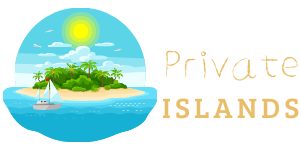Imagine stepping out of a seaplane onto a private beach, where stewards rush to retrieve your luggage and white-gloved butlers greet you with a glass of Champagne. That’s the kind of luxurious island escape that many of us dream of, but owning a private island isn’t for everyone. In fact, the process of purchasing an island is fairly complicated and expensive. But if you’re willing to do your homework and are prepared for the challenges that come with ownership, it is possible to get an idyllic hideaway without spending billions of dollars.
A private island is a rare status symbol, and one that’s increasingly in reach for the upscale traveler. “Island hunting is a very big part of our business,” says Chris Krolow, CEO of the Canadian real estate firm Private Islands Inc., which rents and sells more than 800 islands. During the pandemic, inquiries about buying islands spiked to 150 per day, up from 100 before it began, and Krolow has seen the price tag for such properties double in some cases.
While a private island can offer an antidote to overcrowded, major tourist destinations, the costs can add up quickly. If you’re in the market for an island, consider setting a budget and sticking to it. And make sure you factor in the cost of traveling to and from your island, as well as the ongoing expenses associated with maintaining your property.
Think about what kind of vacation you want to have, and choose a location that meets your needs. For example, if you plan to host guests on your island, it’s a good idea to choose a place that has access to amenities like restaurants, hotels and grocery stores. And consider the types of recreational activities you’ll have available, such as hiking or scuba diving.
Once you’ve narrowed down the possibilities, ask the broker you’re working with to provide you with a list of available islands for sale or lease. It’s important to select an agent who is experienced in the local culture and can help you navigate the often complex legal issues that are unique to islands.
When choosing an island, it’s also crucial to think about what type of infrastructure you need, including power and water. Having these essentials in place will ensure that you can enjoy your private island retreat even during times of extreme weather. And don’t forget to research any environmental issues that may be relevant to your specific island. For instance, a private island in Nova Scotia may seem perfect for a nature-lover, but you’ll need to know that the area is a hotspot for off-grid wildlife spotting, including deer and migratory whales. If you’re not ready for such a challenge, another option may be to buy a more established resort-style private island where the infrastructure is already in place. These types of islands typically have more amenities and can be easier to manage. They’re also a bit more affordable.
